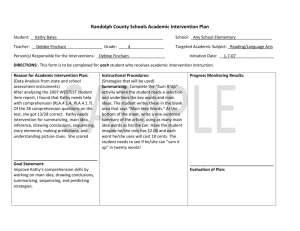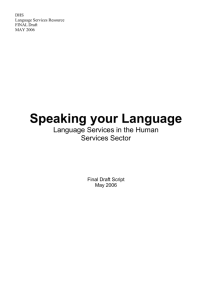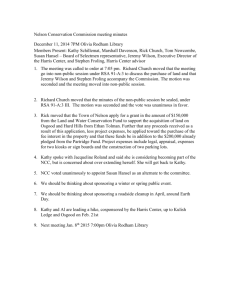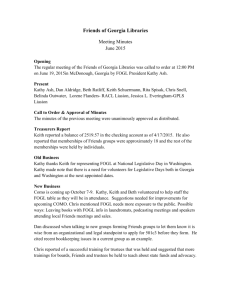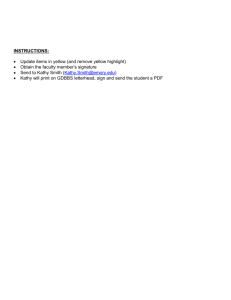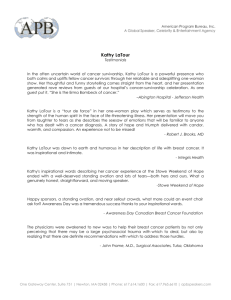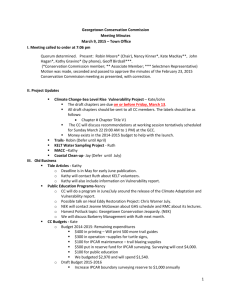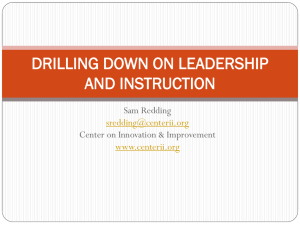DOCX
advertisement
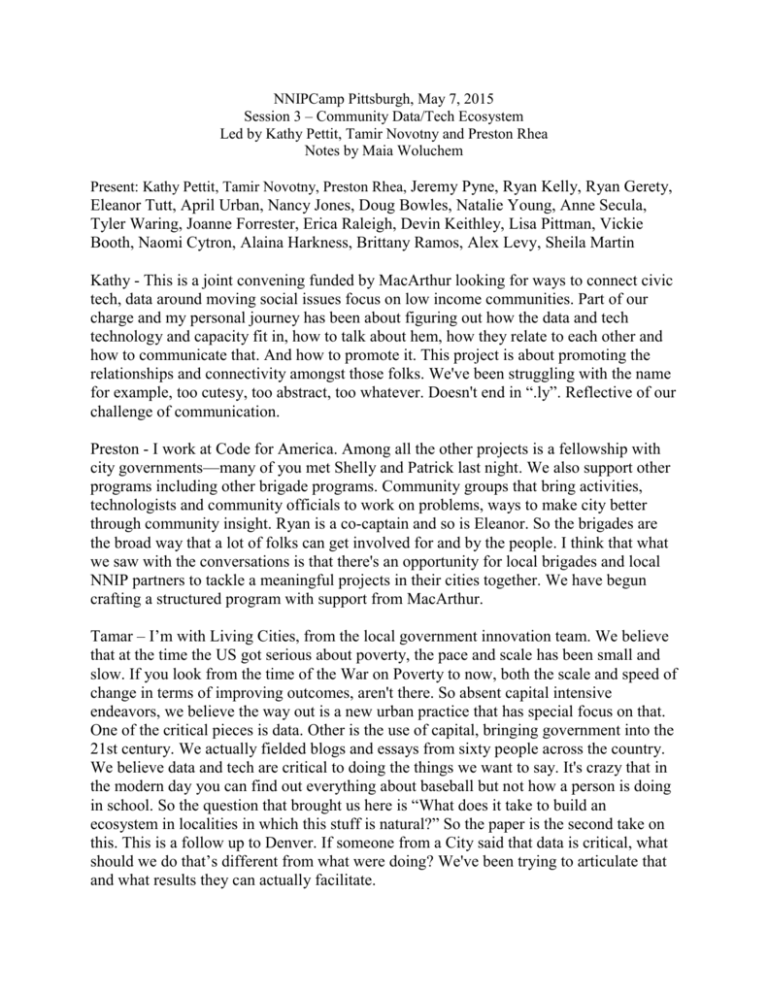
NNIPCamp Pittsburgh, May 7, 2015 Session 3 – Community Data/Tech Ecosystem Led by Kathy Pettit, Tamir Novotny and Preston Rhea Notes by Maia Woluchem Present: Kathy Pettit, Tamir Novotny, Preston Rhea, Jeremy Pyne, Ryan Kelly, Ryan Gerety, Eleanor Tutt, April Urban, Nancy Jones, Doug Bowles, Natalie Young, Anne Secula, Tyler Waring, Joanne Forrester, Erica Raleigh, Devin Keithley, Lisa Pittman, Vickie Booth, Naomi Cytron, Alaina Harkness, Brittany Ramos, Alex Levy, Sheila Martin Kathy - This is a joint convening funded by MacArthur looking for ways to connect civic tech, data around moving social issues focus on low income communities. Part of our charge and my personal journey has been about figuring out how the data and tech technology and capacity fit in, how to talk about hem, how they relate to each other and how to communicate that. And how to promote it. This project is about promoting the relationships and connectivity amongst those folks. We've been struggling with the name for example, too cutesy, too abstract, too whatever. Doesn't end in “.ly”. Reflective of our challenge of communication. Preston - I work at Code for America. Among all the other projects is a fellowship with city governments—many of you met Shelly and Patrick last night. We also support other programs including other brigade programs. Community groups that bring activities, technologists and community officials to work on problems, ways to make city better through community insight. Ryan is a co-captain and so is Eleanor. So the brigades are the broad way that a lot of folks can get involved for and by the people. I think that what we saw with the conversations is that there's an opportunity for local brigades and local NNIP partners to tackle a meaningful projects in their cities together. We have begun crafting a structured program with support from MacArthur. Tamar – I’m with Living Cities, from the local government innovation team. We believe that at the time the US got serious about poverty, the pace and scale has been small and slow. If you look from the time of the War on Poverty to now, both the scale and speed of change in terms of improving outcomes, aren't there. So absent capital intensive endeavors, we believe the way out is a new urban practice that has special focus on that. One of the critical pieces is data. Other is the use of capital, bringing government into the 21st century. We actually fielded blogs and essays from sixty people across the country. We believe data and tech are critical to doing the things we want to say. It's crazy that in the modern day you can find out everything about baseball but not how a person is doing in school. So the question that brought us here is “What does it take to build an ecosystem in localities in which this stuff is natural?” So the paper is the second take on this. This is a follow up to Denver. If someone from a City said that data is critical, what should we do that’s different from what were doing? We've been trying to articulate that and what results they can actually facilitate. Kathy - This is a working draft so your input is at a point that we’re not even looking for tweaks but that we’re structuring pieces. We're all at a point of getting the content right but the next step is messaging and branding. This hour is useful to make sure we have the guts right. Tamir - The litmus test is - do things in here speak to the things you've been trying to do and have been doing well or is this stuff that you haven't thought about? We'd love to have help figuring out how to do this. This should be very helpful. Tamir – Kathy’s got the ingredients. There are a few questions that we're seeking to answer. If you did this stuff (referring to concept paper) well, what would you accomplish? The things on page two say that. Worth noting that this was derived from something Code for America did. And it had five things that all governments should be doing for the people by the people but we're not talking about government, we're talking about players. We looked at things like better evidence for practice, better experience of services, thinking of people who stand in front of bullet proof glass who need to get things for their families, and civic engagement. If you look at the categories there, are there things we've missed? Doug - Just looking based on what you're saying the mission is, I would think that there’s some kind of concern about the digital divide. Should be an important ingredient in that. Just last weekend I was at an event talking about national hacking day but it also made me think about another group operating right now called Connecting for Good that came there because of Google. When Google came to Kansas City to provide access, the guys that came there were involved in wifi for Occupy Wall Street. These guys are engaged in building an infrastructure for communities that can't afford to pay for Google and whatever else. So it should be part of this effort. Kathy - On the ingredients page, it doesn't mention the hardware access but the skills and tools, the people need tools. It’s a good jargon check for us. The systems need stuff, the people need stuff. We need to build digital literacy. Doug - They have classes for people and all kinds of stuff. Alaina - What jumps out at this and the reason I feel we’re invested, is not the killer app but the killer map. The visual picture of this. I want to see it on one thing. If we're talking about an informed city, organizations have the data and know how to use it, people have access to Internet, and gives a natural “who what why” and that gives us the principles we entered and want. It's missing the diagram. Anne – The Inform and Connecting Communities Campaign is thinking about how people are informed and connected. I think it's the merger. If we can think about how merger and… April - This might be a part of the governance component. But the concept of flexibility. The ability to adapt and change. Resiliency. Preston - On that point of access and presence, I notice that communities, the people affected by issues, are listed but not in breakouts for key players. I would like to emphasize more greatly that the folks in question need to be leaders and equal partners. Because that figure is overwhelmed by other parties. I went to a housing forum in San Francisco and it was about affordable housing and there wasn’t a single affordable housing rep on the panel. Kathy - I also feel like we use communities for a lot of different things. Preston - I want to make sure we're” here with not for”. That there is an even balance of participation. Will be challenging, involves skill sharing and listening. Kathy - If we don't admit race and power issues here, there’s a problem Anne - The goal of this is better information data in the hands of people right?? Kathy - Not an “or” more of an “and”. We think that Twin Cities is a good place for tech infrastructure. What are you missing ? Alaina - Articulating why is it important to have the university connected to the city, cause trying to understand where are the missing links Tamar - The goal isn't about writing a nice white paper, but developing the tools. Nancy - Other player . Local journalists are really critical. Them being always aware that this is happening, is fundamental. They play truth. It's so clear to me, the last two weeks in Baltimore, that it's a movement that national journalists aren’t getting the truth for. They're trying to tell a story in a time span that's not realistic. But we have data journalists who are seeking out information. So if data is to have any meaning, the local journalists must recognize that they're a tool and they will push for that truth to get out. Alex Levy - I was thinking of something like this. There needs to be the final step to put the data in the hands of the people who need it. But I have no note of how many datadriven findings are being used to sway the policymakers. Kathy - This is from Jake’s performance management. There needs to be evidence, they need to get to the right people, and they need to DO something with it. Three diff steps that need to be taken Preston - I wish John Wallace was here to saying passive and active evidence, his talk was excellent and full of providing a strong statement that Eire evidence based about how he puts it in a framework that's not colonial but integral to making decisions. Vickie - So if you look at the theory of diffusion of innovation, it's some of what you're talking about here. One is the successful case studies, validated ground truth. One is the communities impacted and the other of that was what was the cost to the different players and what was the benefit so that people understand why they need to come to the table Nancy Jones - The other thing is about tellers. It's the messengers element. The messaging. I mean, I am in awe of some local journalists in Maryland that were so knowledgeable to begin with and they were so great to put out writing so quickly and they serve as a tool for community members as too often, they go to the officials like the mayor or Board of Ed meetings. But to have to engage them with the community members at this type of event? It's messengers and it’s audience. Kathy - I think we're mixing up identify vs home vs skills or function. You could have data specialists in government but we need to figure out this key players thing. The thing we focus on at NNIP is that there's something about home but it doesn’t need to be about the same thing. We're conflating these. April - Local funders would really need to be on the list of key players and resources providers Alaina – Getting specific about what it costs, some of these things are new functions that aren't currently provided for so sometimes it’s getting honest about the services we might have. Kathy - We don't have the awareness that it's gonna cost something Erica - Is there an expected economic benefit? Is there an expectation that this could help bring people out of poverty? Tamir - It would be part of it. For example if you're a Strive partnership city and you have trouble getting data, now you can do that. To that extent I don't think we would say that this in and of itself would move the needle on its own. On the with not for, it's an interesting concept because of solving the digital divide because it could make a diff in terms of skills building, particularly in terms of job. Doug - The digital divide, addressing it, will improve opportunities. Tamir - Are there any additional thoughts on key players? Kathy - Back up to ingredients—there seems to be a convening space or a backbone, you could have key players not working together? Anne - You can call it a network or something. There's an initiative there called Remake Learning that is bringing people that don't often come together around education innovation. That has really taken off. That is really a network ecosystem, catalytic funding that supports new ideas. That has been a really great model. I'm currently the director of the advisory group of it but really there’s no one backbone—just to add to the sustainability of it Eleanor - A convening question. If there's a convening around the civic tech ecosystem, then there's another thing around education or racial justice? I'm not sure that the players would be around issues of a different grouping. I'm wondering how to approach this. Anne – We have different affinity groups. Very grassroots and then there's a systems level infrastructure around issues that we address at the grassroots level. Ryan Gerety - Just building off of what the impacts and outcomes are—some of them are kind of getting back to what is the point of the data and tech, engaging in our communities. It would be stronger to say communities use data, research and technology to address social justice. Because just engaging doesn't really change things. Tamir - I agree with that but I don't think it's an “either or”. I'm on the local government team. So when someone has an idea for a better policy, we can bring them in. I don't want to lose one of the other. Ryan Gerety - So communities have a voice, rather than waiting for the benevolent official Ryan Kelly - the need for collective action is important. But the ingredient I struggle with is the infrastructure piece. The actual infrastructure is a hard problem to tackle. What I'd like to see fixed is that it's so much easier to email data than to put it into a repeatable data system. The fact that in Rhode Island that our major university is only graduating 208 computer science majors right now? Everyone has to put you into a nonprofit and that is a huge block that gets you to these other pieces. Kathy - So that's expertise and infrastructure. Brittany – Our sites are always asking about this. They'll say on a high level that we have them. But what does having them right look like? What is a good model? This gets into the infrastructure, whether that is as effective as it could be and whether you've approached “good” rather than just existing. Maybe that ties into this case studies problem or this has to be supported in this framework. Kathy – It has to be there somewhere to be useful Tamir - One of the things we were talking of is a diagnostic tool. Is there a set of questions that I could be asking or talking to my colleagues about this? Brittany – We’re building something like Adaptive Stride just for broad collective impact. So can our assessment tool become something that’s a part of that or just related? Tamil - there's a lot about how much co-impact is here. Is it good to focus on discrete problems or a formal approach? Unknown - That speaks to me. The difference between a data system and a high tech data system. Even if it doesn't think this, it can look as though it thinks it's reinventing data research, but in terms of he goals, the goals are at least a hundreds of years old. It would be helpful for me to say it's part of a larger framework. Matt gee - I'm wondering if there's a way to go beyond a static document? For example last week, we put together all the data for good people, we wrote down all the lessons we learned. The White House has been doing a series of calls with all the data science meet ups. One of things that came out is that we should create a shared document. Those types of efforts that combine the efforts of lots of groups would be great to contribute to these resources, it would be great to figure out what's done well Kathy - someone that was talking about the standards, Eleanor - I apologize that this isn't directly responding. I could picture a network diagram in St. Louis and some would have a commitment to “with not for”. Is there anything overarching that either would have to buy into to be part of this ecosystem? Kathy - you need a common purpose. More or less inclusive is hard to judge. Some of the people… Eleanor - I don't want to exclude people especially since we need resources. But I could see what would happen Kathy - ingredients are on the list. (Reads list). Do we actually say good quality data anywhere? We just talked about how the county and I don't know who owns the property. We should say that somewhere. Sheila - the value question is an important one, is that a key ingredient? I don't know if you came together at data God good around that shared set of values? Should be a mission or a value statement, Alaina - Eleanor's point was such a good one. There is such a getting equity agenda and there's some part of a civic tech community that's part of making more money. But I think the mayor of Pittsburgh said that there was a neighborhood equity agenda but also a good tech innovation agenda and when those two things converge, that's where we need to be. They're going to have a much broader agenda. Ryan Gerety - On the values side on the community/tech work, we did the digital justice principles. Groups of people would pretty quickly read through them and adopt them. They're available on the Allied Media Projects website. And then on the ingredients piece, I wondered about institution building. It's just volunteers here and there and it's not contributing to more stable infrastructure or movement building that would help with the values piece. Tamir - Any last burning thoughts? April - How does this framework relate to the Bloomberg What Works Initiative? I don't know or understand their framework. Could someone inform me on that? Alaina - They're focused on government. Kathy - I push to include that they would need outside government. Alaina – My sense is that you need a broad sense of partners but generally lead(?) by the government people. Kathy - Open data would be getting people out. I haven't seen a broader framework. They have scales they're working on. Alaina - Likewise at knight their frame is that one thing and moving it forward. Tamir - If you happen to live and work in a Bloomberg city, how do you know how people feel about it? April -My concern is how do we move this forward? And what are they doing? And can they be responsive to this? Tamir- They have been responsive to it. But they think of themselves as part of this greater movement. Kathy - On the practical note, they were going to send us that emirates sunlight cities(?). Alaina - What they haven't done very well is get the community development field to be focused on the key driver of change,
